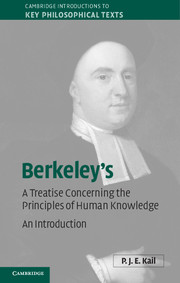Book contents
- Frontmatter
- Dedication
- Contents
- Acknowledgements
- Chapter 1 Introduction
- Chapter 2 Context and aims
- Chapter 3 The Introduction to the Principles
- Chapter 4 The argument for immaterialism
- Chapter 5 Against the philosophers: the refutation of materialism
- Chapter 6 Reality and God
- Chapter 7 Science and mathematics
- Chapter 8 Spirits
- Bibliography
- Index
- References
Chapter 1 - Introduction
Published online by Cambridge University Press: 05 June 2014
- Frontmatter
- Dedication
- Contents
- Acknowledgements
- Chapter 1 Introduction
- Chapter 2 Context and aims
- Chapter 3 The Introduction to the Principles
- Chapter 4 The argument for immaterialism
- Chapter 5 Against the philosophers: the refutation of materialism
- Chapter 6 Reality and God
- Chapter 7 Science and mathematics
- Chapter 8 Spirits
- Bibliography
- Index
- References
Summary
Biographical note
George Berkeley was born in Kilkenny, Ireland, on 12 March 1685. He went up to Trinity College Dublin in 1700, and studied mathematics, classics, logic and philosophy, graduating in 1704. Between graduating and attaining a Fellowship in 1707, he wrote on mathematics and began developing the doctrine for which he is most famous, namely, his doctrine of immaterialism. In 1709, he published An Essay Towards a New Theory of Vision. This work develops a novel account of visual perception, which, though independent from Berkeley’s immaterialism, nevertheless informs it. The work that is the focus of this book, A Treatise Concerning the Principles of Human Knowledge, was published in 1710, and a second edition, which differs in a number of ways, was published in 1734. The year 1712 saw the publication of Passive Obedience, a work that advocated the Christian doctrine that we must assent to the absolute supremacy of the Crown. In 1713, Berkeley visited London for the first time. He fell in with Swift, Addison, Pope and Gay (among others), and published Three Dialogues Between Hylas and Philonous (second edition, 1734) before his first brief tour of Continental Europe. A second continental trip in 1713, when he acted as tutor for St George Ashe, supposedly involved an attempt to meet the elderly Nicolas Malebranche in Paris before a longer stay in Italy. It is not known whether the two actually met. On his return from Europe he published an important essay on the philosophy of science, De Motu (On Motion) in 1721.
- Type
- Chapter
- Information
- Berkeley's A Treatise Concerning the Principles of Human KnowledgeAn Introduction, pp. 1 - 11Publisher: Cambridge University PressPrint publication year: 2014

